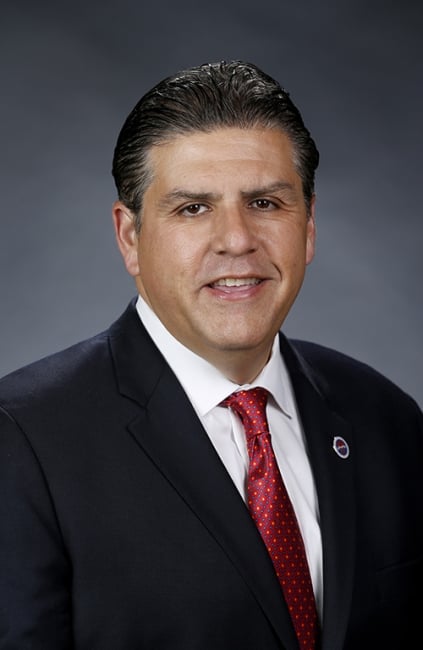You have /5 articles left.
Sign up for a free account or log in.

Joseph I. Castro will be the next chancellor of the California State University system.
Courtesy of the California State University system
The current president of California State University, Fresno, will be the next chancellor of the California State University system, giving the largest four-year higher education system in the country a new leader who is familiar with its workings and the state’s higher education landscape during a deeply uncertain time.
Cal State’s Board of Trustees named Joseph I. Castro the eighth chancellor of the 23-campus, 482,000-student system, effective Jan. 4. Castro, who has been president at Fresno State since 2013, will be the first native of California and the first Mexican American to hold the chancellorship.
He will take over for Timothy P. White, Cal State's chancellor since 2012. White delayed a June retirement planned since last fall because of the coronavirus pandemic.
Castro is a scholar of higher education leadership and public policy. During his tenure, Fresno State emphasized recruiting students from diverse backgrounds and supporting them through graduation. He was previously with the University of California system for 23 years, most recently as vice chancellor of student academic affairs and professor of family and community medicine at UC San Francisco.
“The California State University provides unprecedented and transformational opportunities for students from all backgrounds to earn a high-quality college degree and to better their families, their communities and the industries in which they become leaders,” Castro said in a statement. “There is no other institution that makes this great of an impact on the entire state -- the CSU is key to a growing and thriving California.”
Castro takes over at a time when Cal State is navigating changes on several fronts, many tied to the coronavirus pandemic. The system was among the first and most prominent in the country to this spring announce plans for primarily online learning this fall during the pandemic, although the percentage of students living on campus varies by institution. Then it was again among the first in the country to say it would be primarily online in the spring 2021 semester.
The system has also suspended a requirement that undergraduates submit SAT or ACT scores for students entering in several upcoming admission cycles. It has been facing state budget pressures amid the recession, as well.
Independent of the pandemic, the Cal State system last year reported record-high graduation rates for first-time and transfer students. Its governing board in July approved a one-course ethnic studies and social justice general education requirement, drawing rebuke from the California Faculty Association, which said at the time the requirement was diluted. The topic has been controversial for years and includes a disagreement about system requirements and a requirement already in place at Cal State Northridge.
White’s tenure as Cal State chancellor includes a major push to increase graduation rates and the system breaking with a traditional higher education leadership lineup that was disproportionately white and male by hiring a diverse set of campus presidents. That includes, notably, many women presidents. White has also overseen curricular reforms such as ending requirements that some students take certain remedial courses for no credit.
He has spoken at length about the way personnel and system policies combine to affect outcomes for students. In an interview in January, he said university rankings were less important to him than graduates crossing the stage.
“Cal State was graduating students before I got here, but I think a million have graduated during my time,” White said. “I’m very blessed with a board that has stood with me and is incredibly supportive and challenging to bad ideas and supportive -- enabling -- of the good ones. I love that. And then I think part of it is also the amount of campus leaders and leaders in this building that I’ve been able to bring in. And so people have come in with sort of the sense of pride of this place.”
Castro is the first in his family to graduate from a university -- he earned a bachelor’s degree in political science and a master’s in public policy at UC Berkeley and a Ph.D. in higher education policy and leadership at Stanford University. His grandparents were immigrants from Mexico, and his mother was a single parent.
An interim appointment to lead Fresno State is pending, and Cal State leaders expect to conduct a national search for permanent president for the campus.
“Dr. Castro is a passionate and effective advocate for his students, his campus and the CSU -- in his local community, in Sacramento and in Washington, D.C.,” Lillian Kimbell, chair of the Cal State Board of Trustees, said in a statement. “Above all, he is a leader that inspires greatness in students, faculty and in the broader community. He is the right leader for the California State University in our current circumstance and for our future.”

